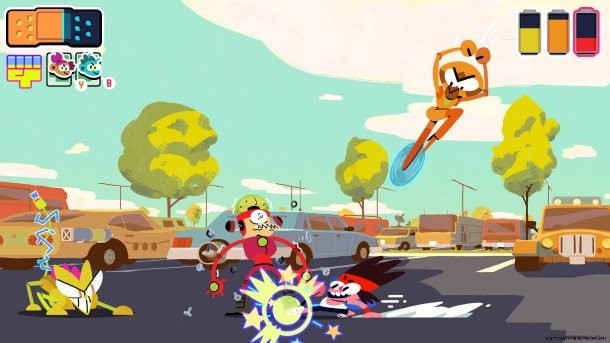How Capybara Games Working With Cartoon Network For OK K.O.! Let's Play Heroes

Ian Jones-Quartey loves video games. He grew up playing them as a kid, and over the years has amassed an enormous library of trivia and inspirations from the medium. Despite this love, Jones-Quartey's career has mostly been in television, working on a number of nerdy Cartoon Network shows like The Venture Bros., Adventure Time, and Steven Universe. But with the show he's currently spearheading, OK K.O.! Let's Be Heroes! Jones-Quartey is finally putting that knowledge to use.
As we've previously reported, OK K.O.! is both a TV show and video game called OK K.O.! Let's Play Heroes, the latter of which is being developed by Sword and Sworcery and Might & Magic: Clash of Heroes developer Capybara games. The show (which debuts this August) showcases a clear love of classic games like Mega Man and Street Fighter, so it was only natural to set a game in the show's universe. But more than any of its other properties, Cartoon Network sees video games as a core part of the OK K.O.! series.
Case in point: Cartoon Network reached out to Capybara about creating a game with them early in the game's development. As fans of each other's work, Capybara co-founder and president Nathan Vella and OK K.O. director Toby Jones had been exchanging emails about working together on a project for a long time, but were waiting on the right property to make it happen. OK K.O.! began life as a series of online shorts and mobile game before Cartoon Network turned it into a full TV show. As the property developed, Capybara began looking at it as an opportunity to create a game in a fleshed-out universe, and Cartoon Network shared much of their storyboards and assets for the show. Capybara was also involved production meetings for the show, where they were blown away by how elaborate and thorough TV production schedules were compared to game schedules.

Another more complex example has to do with how the show is structured. In the game, many major characters (who are super heroes) have been stripped of their power, and protagonist K.O. helps various people with menial tasks that help return them to full strength, which also helps to characterize them. Each quest is a self-contained plot line that moves along quickly. In the demo I played, the most elaborate quest involved helping the character Rad (voiced by Jones-Quartey) with his van. Initially, the job is to stay by the van and make sure nothing happens to it, though when K.O. gets there, the van is already vandalized. The van is eventually stolen, which means K.O. has to ask Enid (one of his bosses) to help him retrieve it. These short side quests comprise most of the game, and in looking at how these quests played out, Jones-Quartey decided to employ a similar structure (having K.O. help a character out as a way to characterize them) in the full-length episodes of the show.
Similarly, Capy is taking much of its game design inspiration from the game's video game-centric themes. Because many of the moves in the game are inpsired by retro classics, the game plays like a cross between old-school beat-'em-ups like River City Ransom (though it takes place on a two-dimensional plane) and a fighting game. When helping retrieve Rad's van, K.O. has to fight off a few opponents, though I'm told there won't be as many enemies as in most beat-'em-ups. Instead, there will be fewer enemies on which K.O. can unleash stylish combos, using a mix of quick attacks, launchers, and character assists (similar to Marvel Vs. Capcom). These combos are fast and easy to pull off, though they don't feel as tight as they would in an actual fighting game. However, there also more modern game elements, such as simple dialogue trees that let you control how K.O. responds to certain situations.
Because Cartoon Network and Capybara see this as an opportunity to build a franchise together, this cross-pollination of ideas allows the world to grow. Previously an animation director on The Venture Bros., Jones-Quartey is deeply familiar with TV shows that rely on creating a world filled with characters who each have extensive backstories, and he sees the game as way to populate the world with lots of interesting, quirky characters. Characters who have bit parts in the series will have more fleshed out roles in the game. Additionally, the game (which releases this Fall) will feature locations not in the TV show.
It's hard to know how OK K.O.! Let's Play Heroes will come together as a full game (the demo we played was limited to a couple of quests and a few fights), but the world and characters of OK K.O. make a strong first impression. It will also be be interesting to see how the franchise, which so far has plenty of Jones-Quartey and Capybara's influences all over it, will shape itself as a game and TV show in the coming months.

Get the Game Informer Print Edition!
Explore your favorite games in premium print format, delivered to your door.
- 10 issues per year
- Only $4.80 per issue
- Full digital magazine archive access
- Since 1991









